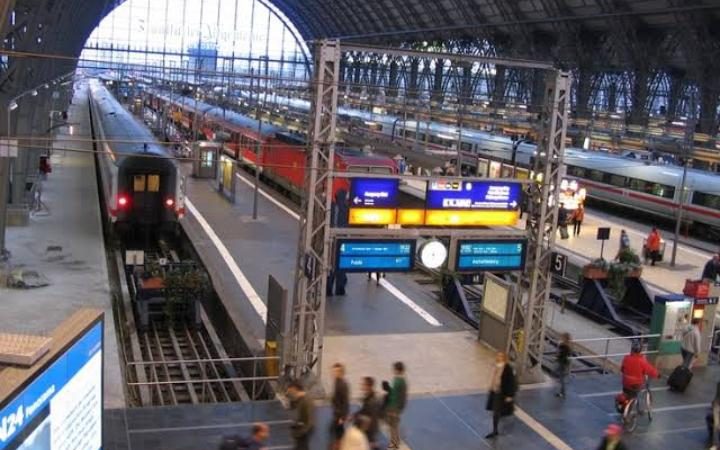
Germany is currently grappling with its longest rail strike as the German train drivers’ union, GDL, initiated its most extended strike on record last night. The strike, which is anticipated to persist until Monday evening, constitutes the fourth occurrence in the ongoing collective dispute, with no resolution currently in view. The six-day strike led by the German Locomotive Union (GDL) has resulted in widespread disruption to Germany’s rail traffic. Deutsche Bahn reports that approximately 80% of long-distance trains stand cancelled, prompting passengers to brace for substantial restrictions throughout this period.
The German Locomotive Mechanics’ Union (GDL) has commenced its fourth and longest strike within Deutsche Bahn’s passenger transport. Since this morning, there have been notable limitations on rail services. Customers relying on long-distance transportation are advised to check the railway’s emergency schedule online, as announced by the company. The strike signifies a substantial disruption in the usual operations of Deutsche Bahn’s passenger transport system, emphasizing the ongoing challenges in labor relations within the railway industry.
Read also: Huge £13 billion rail project to connect Europe and Africa
The longest rail strike in Germany will last until Monday evening
Under the leadership of Claus Weselsky, the German Locomotive Mechanics’ Union (GDL) aims to disrupt significant portions of rail traffic for an approximate duration of six days. The strike in freight transport commenced on Tuesday evening at 18:00, while the strike in passenger transport began at 2:00 in the morning. This industrial dispute is projected to persist until Monday night, marking the first instance where the ongoing collective bargaining disagreement extends over an entire weekend. The move underscores the intensity and prolonged nature of the current labor dispute within the railway industry.
Apart from financial demands, the core of the collective bargaining conflict primarily centers around the reduction of the weekly working time for shift workers. The German Locomotive Mechanics’ Union (GDL) is advocating for a reduction from 38 to 35 hours per week while maintaining the current salary levels. On the contrary, the railway has proposed an alternative model, allowing for a one-hour reduction in working hours with full pay. Those who opt not to choose this option would receive a 2.7% increase in their compensation, as reported by Tagesschau. This divergence in proposals highlights a key sticking point in the negotiations, emphasizing the differing perspectives on work hours and compensation within the ongoing dispute.
Read also: Germany eases naturalization laws to welcome skilled international workers
Union boss Weselsky believes the offer is not a basis for further negotiations . The railroad is not willing to negotiate, so the strike is “legal, proportionate and permissible,” he said.
The letter of the trade unionists
In a letter addressed to Deutsche Bahn, the German Locomotive Mechanics’ Union (GDL) has reiterated its tariff demands, providing specific details on some of them. The letter, published by GDL on Wednesday, states that the proposals are grounded in the collective agreements reached with other bargaining partners in recent weeks. One key aspect is the proposal for a specific timetable outlining the necessary reduction of the weekly working time for shift workers from 38 to 35 hours by 2028, without incurring financial losses. This demand remains at the core of the union’s stance and represents a major point of contention in the ongoing collective bargaining dispute.
Deutsche Bahn has rejected GDL’s proposals as a basis for further negotiations, dismissing them as a “repetition of the well-known maximum requirements,” according to a spokesperson’s statement on Wednesday morning. Claus Weselsky, the head of GDL, criticized Deutsche Bahn’s response, stating on ZDF “Morgenmagazin” on Wednesday, “What Deutsche Bahn AG is doing is nothing more than the repeated rejection of all requests.” When asked about the union’s readiness to resume negotiations, Weselsky responded, “As soon as Deutsche Bahn gets off its high horse.” This exchange highlights the continued deadlock in negotiations and the challenges in finding common ground between the two parties.
Massive effects on industry as well
The impact of the six-day rail strike in Germany extends beyond passenger inconvenience, significantly affecting various industries, particularly those heavily reliant on rail freight. Industries, especially in the German automotive sector with a substantial share of rail freight, are compelled to rearrange their logistics plans. The Automotive Industry Association (VDA) expressed concerns, emphasizing that the strike is creating pressure on transport logistics in Germany and Europe, thereby impacting companies in the German car industry.
Similarly, the chemical industry, which heavily relies on rail transport, faces challenges. Although companies in this sector have swiftly devised flexible solutions with customers and logistics service providers, these measures can only partially offset the restrictions and delays in rail logistics caused by the strike.
The economic toll of the strike is significant, with a one-day nationwide rail strike estimated to cost around 100 million euros per day in economic output, as noted by Michael Grömling, the head of economic activity at the Institute for German Economics (IW Köln). With the strike’s duration extended to six days, the costs are not increasing linearly but at times multiplying. Grömling highlights the potential damages nearing one billion euros, underscoring the substantial economic consequences of the prolonged disruption caused by the strike.
